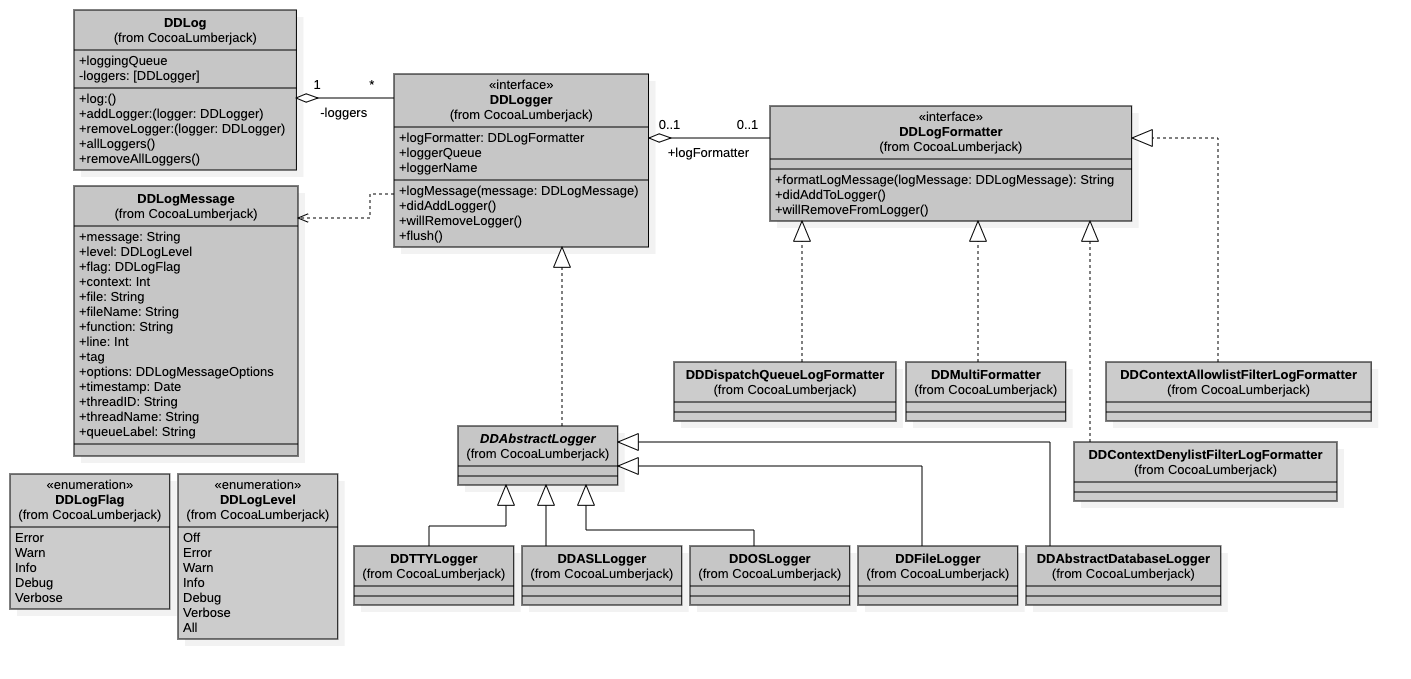CocoaLumberjack is a fast & simple, yet powerful & flexible logging framework for Mac and iOS.
First, install CocoaLumberjack via CocoaPods, Carthage, Swift Package Manager or manually.
Then use DDOSLogger for iOS 10 and later, or DDTTYLogger and DDASLLogger for earlier versions to begin logging messages.
platform :ios, '8.0'
target 'SampleTarget' do
use_frameworks!
pod 'CocoaLumberjack/Swift'
endNote: Swift is a subspec which will include all the Obj-C code plus the Swift one, so this is sufficient.
For more details about how to use Swift with Lumberjack, see this conversation.
For Objective-C use the following:
platform :ios, '8.0'
target 'SampleTarget' do
pod 'CocoaLumberjack'
endCarthage is a lightweight dependency manager for Swift and Objective-C. It leverages CocoaTouch modules and is less invasive than CocoaPods.
To install with Carthage, follow the instruction on Carthage
Cartfile
github "CocoaLumberjack/CocoaLumberjack"
As of CocoaLumberjack 3.6.0, you can use the Swift Package Manager as integration method. If you want to use the Swift Package Manager as integration method, either use Xcode to add the package dependency or add the following dependency to your Package.swift:
.package(url: "https://github.com/CocoaLumberjack/CocoaLumberjack.git", from: "3.6.0"),If you want to install CocoaLumberjack manually, read the manual installation guide for more information.
Usually, you can simply import CocoaLumberjackSwift. If you installed CocoaLumberjack using CocoaPods, you need to use import CocoaLumberjack instead.
DDLog.add(DDOSLogger.sharedInstance) // Uses os_log
let fileLogger: DDFileLogger = DDFileLogger() // File Logger
fileLogger.rollingFrequency = 60 * 60 * 24 // 24 hours
fileLogger.logFileManager.maximumNumberOfLogFiles = 7
DDLog.add(fileLogger)
...
DDLogVerbose("Verbose")
DDLogDebug("Debug")
DDLogInfo("Info")
DDLogWarn("Warn")
DDLogError("Error")If you're using Lumberjack as a framework, you can @import CocoaLumberjack;.
Otherwise, #import <CocoaLumberjack/CocoaLumberjack.h>
[DDLog addLogger:[DDOSLogger sharedInstance]]; // Uses os_log
DDFileLogger *fileLogger = [[DDFileLogger alloc] init]; // File Logger
fileLogger.rollingFrequency = 60 * 60 * 24; // 24 hour rolling
fileLogger.logFileManager.maximumNumberOfLogFiles = 7;
[DDLog addLogger:fileLogger];
...
DDLogVerbose(@"Verbose");
DDLogDebug(@"Debug");
DDLogInfo(@"Info");
DDLogWarn(@"Warn");
DDLogError(@"Error");- read the Getting started guide, check out the FAQ section or the other docs
- if you find issues or want to suggest improvements, create an issue or a pull request
- for all kinds of questions involving CocoaLumberjack, use the Google group or StackOverflow (use #lumberjack).
- To be determined
It is similar in concept to other popular logging frameworks such as log4j, yet is designed specifically for Objective-C, and takes advantage of features such as multi-threading, grand central dispatch (if available), lockless atomic operations, and the dynamic nature of the Objective-C runtime.
In most cases it is an order of magnitude faster than NSLog.
It takes as little as a single line of code to configure lumberjack when your application launches. Then simply replace your NSLog statements with DDLog statements and that's about it. (And the DDLog macros have the exact same format and syntax as NSLog, so it's super easy.)
One log statement can be sent to multiple loggers, meaning you can log to a file and the console simultaneously. Want more? Create your own loggers (it's easy) and send your log statements over the network. Or to a database or distributed file system. The sky is the limit.
Configure your logging however you want. Change log levels per file (perfect for debugging). Change log levels per logger (verbose console, but concise log file). Change log levels per xcode configuration (verbose debug, but concise release). Have your log statements compiled out of the release build. Customize the number of log levels for your application. Add your own fine-grained logging. Dynamically change log levels during runtime. Choose how & when you want your log files to be rolled. Upload your log files to a central server. Compress archived log files to save disk space...
- You're looking for a way to track down that impossible-to-reproduce bug that keeps popping up in the field.
- You're frustrated with the super short console log on the iPhone.
- You're looking to take your application to the next level in terms of support and stability.
- You're looking for an enterprise level logging solution for your application (Mac or iPhone).
- Get started using Lumberjack
- Different log levels for Debug and Release builds
- Different log levels for each logger
- Use colors in the Xcode debugging console
- Write your own custom formatters
- FAQ
- Analysis of performance with benchmarks
- Common issues you may encounter and their solutions
- AppCode support
- Full Lumberjack documentation
The current version of Lumberjack requires:
- Xcode 11 or later
- Swift 5.0 or later
- iOS 8 or later
- macOS 10.10 or later
- watchOS 3 or later
- tvOS 9 or later
- for Xcode 10 and Swift 4.2, use the 3.5.2 version
- for iOS 6, iOS 7, OS X 10.8, OS X 10.9 and Xcode 9, use the 3.4.2 version
- for iOS 5 and OS X 10.7, use the 3.3 version
- for Xcode 8 and Swift 3, use the 3.2 version
- for Xcode 7.3 and Swift 2.3, use the 2.4.0 version
- for Xcode 7.3 and Swift 2.2, use the 2.3.0 version
- for Xcode 7.2 and 7.1, use the 2.2.0 version
- for Xcode 7.0 or earlier, use the 2.1.0 version
- for Xcode 6 or earlier, use the 2.0.x version
- for OS X < 10.7 support, use the 1.6.0 version
- If you need help, use Stack Overflow. (Tag 'lumberjack')
- If you'd like to ask a general question, use Stack Overflow.
- If you found a bug, open an issue.
- If you have a feature request, open an issue.
- If you want to contribute, submit a pull request.
- Robbie Hanson
- Love the project? Wanna buy me a coffee? (or a beer :D)
- Ernesto Rivera
- Dmitry Vorobyov
- Bogdan Poplauschi
- C.W. Betts
- Koichi Yokota (sushichop)
- Nick Brook
- Florian Friedrich
- Stephan Diederich
- Kent Sutherland
- Dmitry Lobanov
- Hakon Hanesand
- CocoaLumberjack is available under the BSD 3 license. See the LICENSE file.
- LogIO-CocoaLumberjack A log.io logger for CocoaLumberjack
- XCDLumberjackNSLogger CocoaLumberjack logger which sends logs to NSLogger







